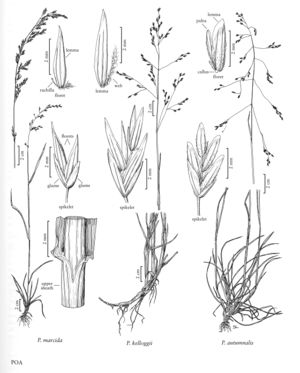Difference between revisions of "Poa kelloggii"
FNA>Volume Importer |
FNA>Volume Importer |
||
| Line 17: | Line 17: | ||
-->{{Treatment/Body | -->{{Treatment/Body | ||
|distribution=Calif. | |distribution=Calif. | ||
| − | |discussion=<p | + | |discussion=<p>Poa kelloggii grows in rich coastal forests, especially redwood forests, in California. It is not common. Reports from Oregon and British Columbia are based on misidentifications of P. laxiflora (p. 538) and P. howellii (p. 534), respectively.</p> |
|tables= | |tables= | ||
|references= | |references= | ||
| Line 33: | Line 33: | ||
|basionyms= | |basionyms= | ||
|family=Poaceae | |family=Poaceae | ||
| + | |illustrator=Sandy Long | ||
|distribution=Calif. | |distribution=Calif. | ||
|reference=None | |reference=None | ||
| Line 38: | Line 39: | ||
|publication year= | |publication year= | ||
|special status= | |special status= | ||
| − | |source xml=https:// | + | |source xml=https://bibilujan@bitbucket.org/aafc-mbb/fna-data-curation.git/src/314eb390f968962f596ae85f506b4b3db8683b1b/coarse_grained_fna_xml/V24/V24_715.xml |
|subfamily=Poaceae subfam. Pooideae | |subfamily=Poaceae subfam. Pooideae | ||
|tribe=Poaceae tribe Poeae | |tribe=Poaceae tribe Poeae | ||
Revision as of 16:09, 30 October 2019
Plants perennial; rhizomatous, loosely tufted, culms solitary to several. Basal branching mainly extravaginal. Culms 28-85 cm, erect or the bases decumbent, terete or weakly compressed; nodes terete, 1-2 exserted. Sheaths closed for about 1/15 – 1/5 their length, sometimes fused for a longer distance by a narrow hyaline membrane, terete, bases of basal sheaths glabrous, distal sheath lengths 0.8-1.5 times blade lengths; ligules 0.5-3 mm, scabrous, usually lacerate; blades scarcely reduced in length distally, 2-5 mm wide, flat, lax, apices narrowly prow-shaped, flag leaf blades 5-15 cm long. Panicles 10-20 cm, erect, pyramidal, open, sparse, with 25-70 spikelets; nodes with 1-3(5) branches; branches 5-15 cm, ascending, straight, spreading to eventually reflexed, angled, angles mostly moderately to densely scabrous, with 5-15 spikelets. Spikelets 4.5-6 mm, lengths 3.5 times widths, laterally compressed; florets 2-3; rachilla internodes, at least some, longer than 1 mm, smooth, glabrous. Glumes distinctly keeled; lower glumes 1-3-veined; upper glumes shorter than or subequal to the lowest lemmas; calluses webbed, hairs over 1/2 the lemma length; lemmas 3.5-5 mm, narrowly lanceolate, distinctly keeled, smooth, glabrous throughout, lateral veins moderately prominent, apices acute to acuminate; paleas smooth to scabrous over the keels; anthers about 2 mm. 2n = 56.
Discussion
Poa kelloggii grows in rich coastal forests, especially redwood forests, in California. It is not common. Reports from Oregon and British Columbia are based on misidentifications of P. laxiflora (p. 538) and P. howellii (p. 534), respectively.
Selected References
None.
